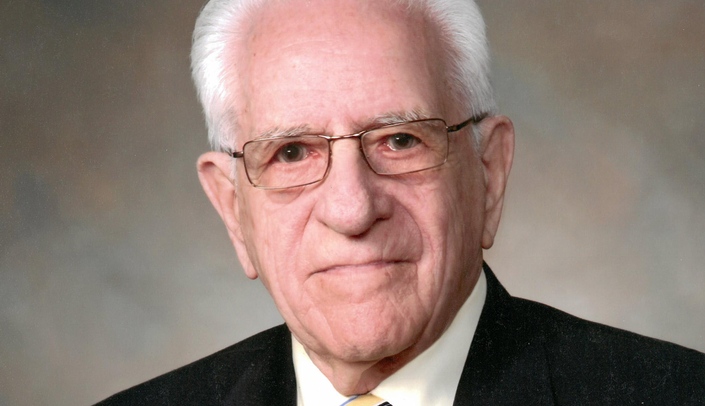Marvin Welstead knows just about everything regarding Alzheimer’s disease (AD).
The 97-year-old retired banker from Fremont, Neb., read books and research papers, and asked physicians and researchers an infinite number of questions. Basically, he’s self-taught.
He had to be. When his wife, Jean, developed Alzheimer’s in 2001, there were no organizations or support groups in town to help him.
That’s not true anymore. Since 2012, Welstead has devoted his life to helping others impacted by AD in the Fremont area and to furthering research to find a cure for the devastating disease.
For this dedicated service, Welstead will be honored with the University of Nebraska Medical Center’s Community Service to Research Award at the Distinguished Scientists awards ceremony on Feb. 13.
"Marv has been tremendously supportive of AD research at UNMC for the past five years," said nominator Daniel Murman, M.D., vice chair, clinical and translational research, and director of the Memory Disorders Clinic and Geriatric Neurology Program.
"He exemplifies how someone with vision, community involvement, persuasiveness and passion can make an important difference," he said.
Welstead said he is honored by the award. "It’s been a labor of love, but I couldn’t have done it without the help of the great people at UNMC."
After Jean’s death in 2009, Welstead was one of three people who organized the Fremont Area Alzheimer's Committee (now Fremont Area Alzheimer's Collaboration) to harness community support and fundraising efforts to help him in his quest to help others impacted by AD.
The collaboration established the Fremont Area Alzheimer's Fund (FMF) in 2012, administered through the Fremont Area Community Foundation, and began fundraising through an annual Fremont Area Alzheimer's Walk, as well as online gifts, memorials and an annual golf tournament fundraiser.
"It amazes me how the walk grows every year," Welstead said. "Last year we raised $78,000." This year’s walk is set for Sept. 22, and yes, he will be there to walk all 2.5 miles.
The FMF allocates 60 percent of the money raised to support Alzheimer's disease research and 40 percent to support caregiver education programs. Today, there are two support groups that meet monthly in Fremont. Welstead ensures guest speakers, many of them from UNMC, are at each meeting.
The man knows how to raise money and awareness and he gets the entire town and UNMC investigators involved. They regularly communicate the value and excitement of clinical and translational AD research through newspaper and radio station interviews, as guest speakers for the Rotary Club, and of course, as participants in the walk.
Through Welstead’s efforts, the FMF has granted more than $125,000 to support clinical and translational AD research projects at UNMC, through the University of Nebraska Foundation, that will help investigators successfully compete for additional extramural funding.
Five research projects have been funded that have included pilot grants to:
— Build infrastructure for AD clinical trials.
— Purchase a retinal imaging machine (OCT imaging) to study AD and related neurodegenerative conditions;
— Investigate changes in neuronal networks in AD using resting-state fMRI and explore the impact of neuromodulation on memory and these networks;
— Study a transcranial Doppler technique as a potential biomarker for preclinical AD; and
— Understand the neural basis of attention and working memory deficits in patients with AD using MEG.
Three years ago, he established the Marvin and Jean Welstead Alzheimer’s Disease Education and Research Fund through the NU Foundation and annually donates $2,500 from his retirement fund.
"I’ll do anything to help the caregivers and researchers. I just want to help find a cure for AD."
A story of love and devotion
Marvin Welstead married the love of his life, Jean, on his 21st birthday in 1942.
They met at the roller skating rink in Fremont, Neb., where he worked as a ‘skateboy’ in high school. She walked in and he taught her how to skate.
For the next 59 years, they rolled through life together. They had two sons and Jean pursued painting, sculpting and teaching at Midlands College, where her art continues to be displayed.
In the midst of retirement – they were 80-years-old – Jean developed Alzheimer’s. Welstead took care of her at home until he couldn’t and then he would visit her every day in the nursing home.
It was then that he began his research into this deteriorating disease. He chronicled everything about her care on a daily basis.
When Jean developed Parkinson’s disease, she could no longer hold a fork. For two years, Welstead would go to the nursing home and feed her each meal, rub her throat, remind her to chew and swallow. She never lost recognition of her husband.
The last day of her life, the nurses called him to the nursing home at 6:30 a.m. They said Jean was gasping for air. He tried to console her.
"She seemed very bright – like she didn’t have AD," Welstead said.
When he tried to feed her breakfast she turned her head away. He asked her, "Are you teasing me?" She gave him a sly smile.
She died at 5:30 in the evening. They had just celebrated their 67th wedding anniversary.
We are Nebraska Medicine and UNMC. Our mission is to lead the world in transforming lives to create a healthy future for all individuals and communities through premier educational programs, innovative research and extraordinary patient care.
